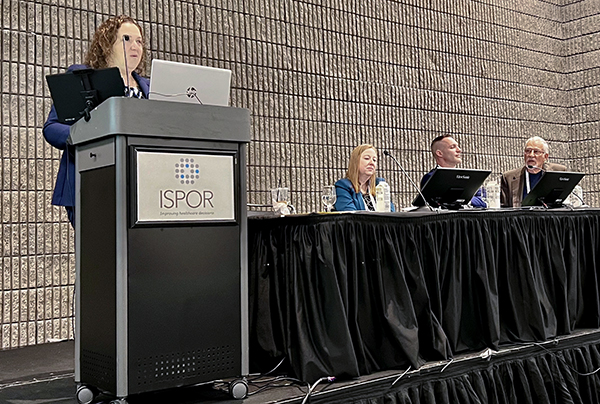Atlanta, GA – On Monday, May 6, NEWDIGS community members presented a panel discussion at the annual ISPOR meeting, “Will the Pediatric Rare Disease Pipeline Create a Financial Tsunami? Implications of a Monte Carlo Projection”. The panel was moderated by Jamie Sullivan, Vice President of Policy at EveryLife Foundation for Rare Diseases, and included Colin Young, Director of Drug Development Pipeline Research at NEWDIGS; Jessica Daw, VP of Pharmacy at Sentara Health Plans; and Ryan Fischer, COO of the Foundation for Angelman Syndrome Therapeutics. The session was attended by a highly engaged audience who asked many insightful questions and wanted to learn more about this topic.
Ms. Sullivan moderated the session and provided opening remarks highlighting that more than 10,000 rare diseases affect more than 30 million Americans, nearly 70% of which manifest in childhood. The drug development pipeline includes hundreds of candidates for pediatric-onset rare disease, but little is known about the impact of potential approvals. To better understand the pipeline of drugs to treat these serious and often life-threatening conditions, EveryLife Foundation sponsored research conducted by NEWDIGS to model potential approvals.
Dr. Colin Young presented the methods and results of a detailed Monte Carlo simulation based on the current drug development pipeline using historical success rates, detailed epidemiological research on the incidence and prevalence of pediatric-onset rare diseases, estimates of the number of these patients likely to have access to these therapeutics based on clinical trial inclusion and exclusion criteria, and the estimated list price revenues from projected approved therapeutics.
Dr. Jessica Daw discussed the treatment affordability challenges faced by health plans for rare conditions, particularly the impact on smaller self-insured employers for whom predicting these costs can be challenging. She emphasized the need for a balanced approach with transparent pricing and value-based arrangements.
Mr. Fischer provided the patient community perspective and explained the challenges patients and their caregivers face. He emphasized that affordability is critical, especially as many families dealing with rare diseases incur many costs not covered by insurance. The need for additional innovation to help people living with rare diseases and their caregivers is tremendous.
About NEWDIGS at Tufts Medical Center
NEWDIGS is dedicated to improving health outcomes by accelerating appropriate and timely access for patient to biomedical products – in ways that work for all stakeholders. NEWDIGS designs, evaluates, and catalyzes the real-world implementation of system innovations that are too complex and cross-cutting to be addressed by a single organization or market sector. Its members include global leaders from patient advocacy, payer organizations, biopharmaceutical companies, regulatory agencies, clinical care, academic research, and investment firms. For more information, visit newdigs.tuftsmedicalcenter.org.
About EveryLife Foundation for Rare Diseases
EveryLife Foundation for Rare Diseases is a nonprofit, nonpartisan organization dedicated to advancing the development of treatment and diagnostic opportunities for rare disease patients through science-driven public policy. The Foundation works to improve the lives of the millions of Americans suffering from rare diseases by advocating for policies that foster innovation and remove barriers to life-saving treatments. Founded in 2009 and headquartered in Washington, DC, the EveryLife Foundation for Rare Diseases has programs throughout the United States. To learn more, visit EveryLifeFoundation.org.
# # #
